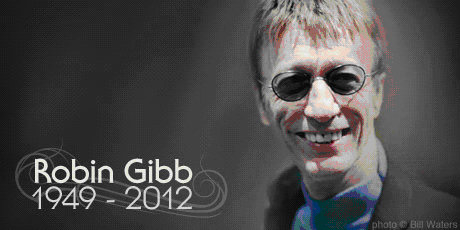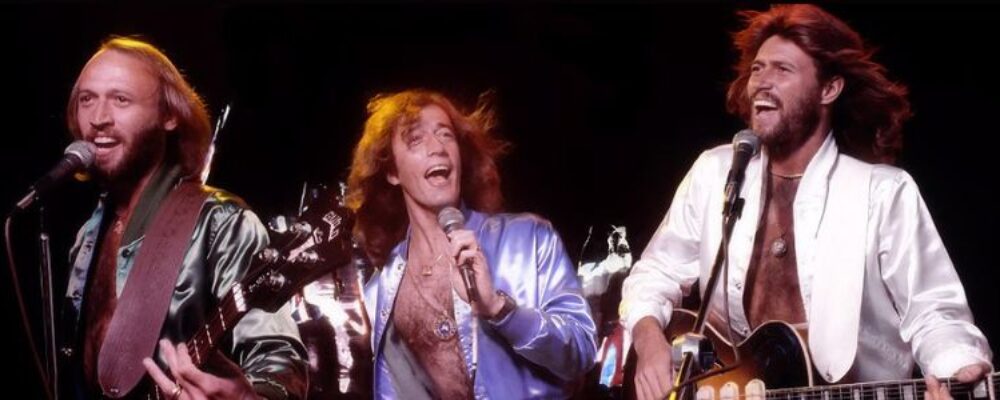In Loving Memory
Dear Maurice
Robin Gibb, whose ethereal voice carried so many Bee Gees hits to the top of the charts, has passed away following a battle with cancer and intestinal surgery. Gibb was 62, and is survived by his wife Dwina, sons Spencer and Robin-John, and daughter Melissa.
Though the Bee Gees are often thought of as Australian, the Gibbs were actually natives of England’s Isle Of Man; Robin Hugh Gibb was born there on December 22, 1949 about half an hour before twin brother Maurice. Sister Lesley and brother Barry preceded them by a few years, while the youngest sibling, Andy, would arrive in 1958, after the family had moved to Manchester.
Shortly after Andy was born, the Gibb clan embarked for Australia. The three eldest boys had shown a strong interest in music back in Britain, and that blossomed after their arrival in Brisbane. Within five years they had a record out (“The Battle Of The Blue And The Grey”) that reached the local Sydney charts; Robin was all of 13. Over the next three years, the trio recorded and wrote more extensively, resulting in their first #1 single, “Spicks And Specks.”

1949-2012
Robin Gibb
These teenagers were now big fish, but Australia is a small musical pond, so they headed back to England in February of 1967 to have a go at conquering the pop world. Which they did in short order, with “New York Mining Disaster 1941” and “Massachusetts” soaring up charts around the globe. Hits “Words” and “I’ve Gotta Get A Message To You” followed in 1968, a year that also saw Robin marry Molly Hullis; they remained together until 1980, raising a son and a daughter.
The Bee Gees’ meteoric ascent brought external pressure and internal conflict, and in early 1969, after the band’s fourth album, Odessa, Robin announced he was leaving the group. His first solo single, “Saved By The Bell,” followed in June of that year to considerable success. In 1970, Robin released his debut solo album Robin’s Reign. Sessions for a follow-up started soon thereafter, but the project was sidelined when the singer reunited with brothers Barry and Maurice. With “Lonely Days” and “How Can You Mend A Broken Heart,” the Bee Gees were quickly back on the hit parade.
While they continued to record and tour successfully, the next few years brought the Gibbs to the realization that they needed something new in their sound. They found it with veteran producer Arif Mardin, who helped steer the Bee Gees into R&B on Mr. Natural and Main Course, which included the #1 single “Jive Talkin’. With the release of 1977’s Saturday Night Fever soundtrack, the Bee Gees reached the absolute pinnacle of pop, and its chart-topping follow-up Spirits Having Flown continued that success to the end of the decade. Along with innumerable awards and honors, the trio organized a huge fundraiser for UNICEF in 1979.
During the 1980s, the Bee Gees individual talents as performers, writers and producers came to the fore. Robin kicked off the decade by writing and producing soul great Jimmy Ruffin’s Sunrise album (which included the Top Ten “Hold On To My Love”); a few months later he was celebrating the success of Barbra Streisand’s “Woman In Love,” a #1 hit he’d co-written with Barry. In 1983, Robin released his second solo album, “How Old Are You”?, which sold briskly thanks to its smash single “Juliet.” “Secret Agent” and “Walls Have Eyes” followed in 1984 and 1985, respectively. Also in 1985, Robin married his second wife, Dwina Murphy.
In the latter half of the decade, the Bee Gees reunited again, releasing ESP, One, and High Civilization for Warner Bros. Before moving to Polydor Records for such albums as Size Isn’t Everything, Still Waters, and This Is Where I Came In. By the mid-1990s, the Bee Gees’ singular place in pop history was undeniable; the band was inducted into both the Songwriters and Rock and Roll Halls Of Fame, and in 2002 the brothers were named to the Queen’s New Years Honour List for their contribution to British music. But a year later, the Bee Gees were dealt a mortal blow when Maurice died suddenly from intestinal blockage.
Despite the loss of his twin brother, Robin soldiered on, releasing his first solo album in nearly two decades, Magnet. His 2004 tour in support of the soulful set brought the performer to Germany, Russia, Asia and Latin America. In 2006, Robin released My Favorite Christmas Carols, a seasonal album. The year also marked the beginning of Rhino’s Bee Gees reissue program, and since then Robin and Barry have occasionally appeared together to keep the group’s flame burning. Robin also made guest appearances with such artists as S5, Take That and Valeriya to bring the Bee Gees songs to life.
Charitable work also kept Robin busy. In 2007 he became president of the International Confederation of Societies of Authors and Composers (CISAC). In 2008 he was named to head Britain’s Heritage Foundation to raise funds for such causes as a memorial to WWII veterans. That year he also became ambassador to the Outward Bound Trust, the U.K.’s leading provider of experiential learning in the outdoors.
While he was always in great demand to help with causes or revisit Bee Gees history, Robin continued to find time for new music. He’d completed recording a solo album a few years ago entitled 50 St. Catherine’s Drive, though it remains unreleased. His final work, “The Titanic Requiem”, arrived in stores on March 26th. A classical album marking the 100th anniversary of the sinking of the legendary ocean liner, the project was composed by Robin and his son Robin-John and performed by The Royal Philharmonic Orchestra. Robin sings lead on one track, “Don’t Cry Alone,” and as unusual as the musical setting might be, the voice is unmistakable. The sound of Robin Gibb’s voice has been a fixture in music for nearly 50 years. The singer may be gone now, but the songs of the Bee Gees have an immortality that very few pop artists ever achieve.
Tune in our Remembering Robin Gibb playlist to hear some of his most celebrated songs.
A Message From Kevin Gore, President & CEO, Rhino Entertainment
“Robin Gibb was one of the great singers and songwriters of our time. From his work alongside his brothers in the Bee Gees to his solo career, Robin’s music has left a significant mark on the last six decades. His impression will be felt for many generations to come and he will be greatly missed.”
